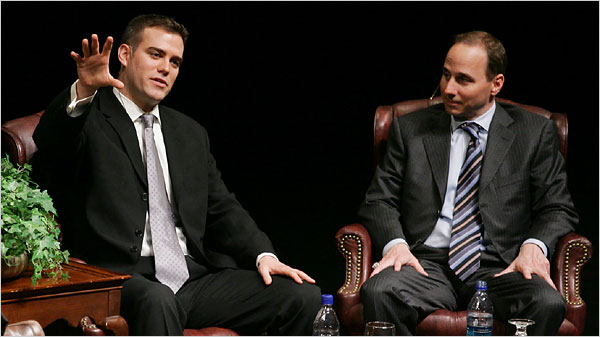In recent days, while teams like the Marlins and Angels snapped up every big name free agent on the market, Brian Cashman preached patience and fiscal responsibility. When Yu Darvish was posted at the end of last week, Cashman said the following (courtesy of Chad Jennings):
“Sometimes, if you like somebody a great deal, it doesn’t necessarily mean you’re going to be in a position to participate,” Cashman said. “I think, obviously he’s extremely talented. If he’s going to get posted, it’s going to be interesting to see how this plays out and how everybody on this side of the fence – meaning all Major League clubs – how they decide to or not to participate, and at what level. But that’s all for another day.”
“We’ve got a lot of depth (in the rotation),” Cashman said. “Can we add to it? We’d like to. But is it realistic? It’s not necessarily that realistic because for me to be able to push through something, I’m probably going to have to overpay to do that. And that’s a tough thing to do, especially when you’re sitting with a lot of talent, a lot of people you could slot in and (have them) do this job. It’s just, do you want to bet on somebody doing it significantly better at the expense of payroll flexibility going forward or (the loss of a prospect in a trade)? I’m OK with the balancing act. I’m OK with the decision making. I didn’t expect much, and it’s hard to improve on what we already have.”
Couple these quotes with the recent reports that the Yankees are trying to cut their payroll in anticipation of being below the luxury tax threshold in 2014, and you have the makings of another quiet offseason for a team that seems to need some established starting pitching. However, despite the fairly pervasive reports that the Yankees are unlikely to bid on Darvish, sign a free agent to a large deal, or give up major prospects to acquire a top starter, there is precedent to suggest that Cashman is simply working to muddy the informational waters.
The most famous example comes from late-2005, when Brian claimed that the Yankees were going to enter the 2006 season with Bubba Crosby as the center fielder. No one quite believed it at the time, but most fans were still stunned when Cashman stole Johnny Damon from the Red Sox a few weeks later. Prior to the 2009 season, the Yankees’ GM suggested that the rumors of the Yankees adding Mark Teixeira, CC Sabathia, and either Derek Lowe or A.J. Burnett were “crazy talk” from a “fantasy land.” He suggested that even acquiring just Sabathia and Teixeira was a ridiculous idea that had no merit. A scant few weeks later, Sabathia, Teixeira, and Burnett were all in pinstripes.
On two other occasions, Cashman made forceful public statements only to later be overruled by management. He stated quite clearly that if A-Rod used the opt-out in his contract following the 2007 season, the Yankees would not participate in his free agency. And just last offseason, he declared that he would not surrender his first round pick, only to be effectively overruled by management a few days later when they signed Rafael Soriano.
The fact of the matter is that it is usually in Cashman’s best interests to be less than forthcoming with the entire and absolute truth. It does him nothing but harm to effusively express interest in a free agent or to suggest that the club has major holes that desperately need to be remedied. Furthermore, when it comes to this particular offseason, with Darvish finally on the market, it actually behooves him to actively spread misinformation:
The process of acquiring players from Japanese baseball includes a blind posting system. Interested teams get to make a single bid for the exclusive rights to negotiate with the player, without knowledge of the bids being made by other clubs. Essentially, clubs need to guess at the market and then make their bid accordingly. This can prove to be extremely difficult, as evidenced by the Red Sox’s $51 million bid for Daisuke Matsuzaka, which reportedly exceeded the next highest bid by at least $15 million.
The guesswork nature of this process lends itself towards misinformation. Teams that are interested in Darvish have an incentive to downplay their level of involvement, which could help suppress the market and lower the range of bids. Conversely, teams that have little interest might feign heavy internal consideration of a large bid, so as to drive up the price for rivals and generally push the market upwards. Taken together, this means that almost all of the information you might hear on Darvish, regarding any team, is likely to be filtered through the lens of self-interest and may be being released to influence the bidding environment. As we saw with the Daisuke situation, until the Nippon Ham Fighters announce the winner, everyone will be in the dark on the posting process.
I entered this offseason expecting the Yankees to add some pitching, and I still believe that all the talk of an austerity budget is a ruse designed to keep the bidding on Darvish reasonably low. That said, the events of last offseason, in which Cashman claimed not to feel a desperate need for pitching and then followed through by not adding a major starter all year, give me pause. The Yankees and Brian Cashman may actually feel that Ivan Nova, Freddy Garcia, Phil Hughes, A.J. Burnett, and Hector Noesi provide them with enough options to construct a quality rotation behind CC Sabathia. It’s also possible that they are running a misinformation campaign, but one targeted at next offseason and players like Cole Hamels. Whatever the truth is, Brian Cashman’s history suggests that we should not be too quick to believe what we read.
